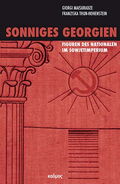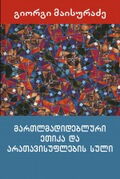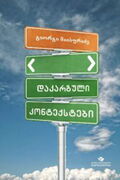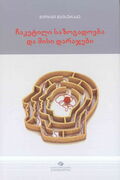Aporias of Forced Modernization. Representations of the National in the Soviet Empire
“Georgia has crossed the crest of the Caucasus” —with these words, the Georgian poet and longtime chairman of the Georgian Writers’ Union, Irakli Abašije (1909–1992) retrospectively signaled in 1991 a new dispositive for the cultural situation in the 1930s. He claimed that Russia no longer set the perception of Georgia, instead, it would be the Georgian culture itself that would determine the strategies of its self-representation through northern expansion. The arena which the Georgian culture had entered—the Soviet Union—was at that time, according to Abašije, a place ruled by terror and violence, while success in industrialization and modernization was celebrated in public discourse and the country was praised as a haven of ‘brotherhood’ and ‘friendship among the peoples.’
The project examined the metaphor of the Soviet Empire as a “communal apartment” (Y. Slezkine) with many rooms, where different nations and nationalities lived together under one roof. This metaphor refers to a wide range of cultural practices: from massive dispossession and forced relocation to growing cohesion up to the escape from forced communal living after 1991. A cultural studies analysis of such discursive, iconographic, and symbolic forms of representation of the National in the Stalin era revealed how the culture of the Soviet National was constructed as genealogical with the aid of specific operations (such as archaisizing, simplification, mythopoesis) and figures (‘Stalin as the father of nations’, ‘Motherland’, ‘Big Brother’).
Georgia was not only chosen as a paradigmatic example of such a research perspective because Stalin’s home was given a lot of attention in the official discourses, but also because, with its long history of tradition, it was always possible to stage Georgian culture—and as it were the Soviet civilization—as particularly archaic. Thus, the representation of Russian history in a 1937 school textbook began with Urartu, the ancient Oriental Empire in Transcaucasia, which was considered the first ‘multi-ethnic state’ on the territory of the subsequent USSR. In the 1930s and 40s, when the Stalinist national canon was established, ethnogenesis, historiography, and literary history lent themselves to ideological instrumentalization, as even the prenational and prehistoric were nationalized. In a pompous staged jubilee (1937), for example, the medieval poet Šota Rustaveli (12th/13th c.) became not only a Georgian National unification figure, but also the symbol of an early Georgian, i.e. ‘Eastern’, Renaissance that preceded the European one. In this way, the Georgian cultural heritage became the central setting, in order to establish the postulate of superiority over the Soviet European culture.
Georgian genealogies, rhetorics, and representations demonstrate the way in which traditional pathos formulas (such as “Sunny Georgia”) and topoi (like the Colchis) were transferred from the romantic-national to the socialist-Soviet paradigm in the space of Soviet culture. (A cross-cultural perspective to Yugoslav and post-Yugoslav developments was included in the discussions through the temporary participation of Zoran Terzić on the project.) The arsenal of rhetorical, symbolic, and iconographic representations of an ideology-compliant nationally-Georgian canon shows that in contrast to the Stalinist formula for the socialist-realist art—“national in form, socialist in content”—the ‘National’ was made increasingly essential and made into a category of content (a thesis which the Russian writer Vasily Grossman had already put forward). This process, which is also understood as “Georgianization” of Georgia (Ronald Suny), implies that the reshaping of Georgia in the Soviet Empire into a “socialist nation” as well as a translation of the romantic-national canon of the 19th century, was linked to the Soviet (Socialist) and a nationalization of the Socialist (in the sense of symbolism and emotional charge). The Soviet-Georgian representations of the National that were studied also refer to the fact that these processes have an abetted nationalism that broke out in post-Soviet Georgia and whose aftermath has remained virulent.
The timeliness of the issue meant that the research of the project was well received, not only from the academic world (including participation in the international conference “Black Sea Identity” at Ilia Chavchavadze University Tbilisi, Batumi 23–24 May 2008), but also in the general media, in Germany as well as Georgia, where nationalism represented a previously little explored phenomenon.
Publications
Sonniges Georgien
Figuren des Nationalen im Sowjetimperium
მართლმადიდებლური ეთიკა და არათავისუფლების სული
დაკარგული კონტექსტები
ჩაკეტილი საზოგადოება და მისი დარაჯები
Giorgi Maisuradze
- sekularizacia da sekularizaciis bedi saquarteloshi [The Secularization and its Fate in Georgia], in: Giga Zedania, Merab Gaganidze (eds.): Säkularisierung: Konzepte und Kontexte. Tbilisi 2009, 266–286 (with Zaal Andronikashvili)
- chaketili sazogadoeba da misi darajebi [The Closed Society and its Guardians], in: Tskheli shokoladi 46 (2009), 87–94
- stalinis aqcenti da qartuli enis apokalifsi [Stalin's Accent and the Apocalypse of Georgian Language], in: Tskheli shokoladi 48 (2009), 101–113
- patriotizmi rogorc religia [Patriotism as Religion], in: Tskheli shokoladi 49 (2009), 99–108
- temi da satogadoeba [Community and Society], in: Tshheli shokoladi 50 (2009), 96–108
- gmiri [The hero], in: Tskheli shokoladi 51 (2009), 88–98
- panteonidan panteonamde [From Pantheon to Pantheon], in: Tskheli shokoladi 53 (2009), 106–113
- gadzlierebuli locva. martlmadidebloba postsabchota saqartveloshi [‘To pray more intense’. Orthodoxy in Post-Soviet Times], in: Tskheli shokoladi 56 (2010), 97–106
- postsachota kavshiri anu gandevnili warsuli [The Post-Soviet Union or the Suppressed Past], in: Tskheli shokoladi 59 (2010), 103–111
- xma ghvtisa da xma erisa [The Voice of God and the Voice of the People], in: Tskheli shokoladi 63 (2010), 109–116
- didi da mcire imperiebi [The Big Empire and the Small Empire], in: Tskheli schokoladi 66 (2010)
Zaal Andronikashivili
- Denkmalkultur in Georgien, in: Geisteswissenschaftliche Zentren Berlin. Bericht über das Forschungsjahr 2008, 73–82
- “Talent der illegitimen Freude”. Zur Affektordnung des georgischen Festes, in: Trajekte 17 (2008): Ausdruck, Erscheinung, Affekte, 43–46
- Subversive Zweisprachigkeit. Mziuri, in: Dirk Naguschewski, Stefan Willer: Also singen wir. 60 Beiträge zur Kulturgeschichte der Musik. Berlin: Trajekte Extra 2010
Events
Sonniges Georgien
Botschaft der Republik Georgien, Rauchstraße 11, 10787 Berlin
Der Kulturheros – ein Paradigma zwischen Kult, Kultur und Politik
ZfL, Schützenstr. 18, 10117 Berlin, 3. Et., Seminarraum 303
Das 'Nationale' und das 'Imperiale' (Russisches Reich und Sowjetunion)
ZfL, Schützenstr. 18, 10117 Berlin, 3. Et., R. 303
Politische Narrative und Inszenierungen in aktueller russischer Literatur
ZfL, Schützenstr. 18, 10117 Berlin, 3. Et., Raum 303
Media Response
Rezension von Stephan Wackwitz, in: Frankfurter Allgemeine Zeitung vom 16.05.2015, S. 10



